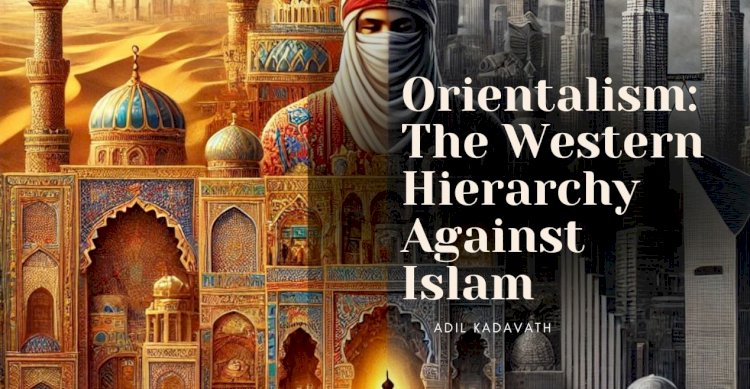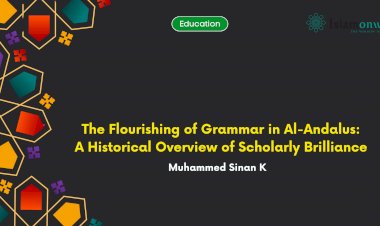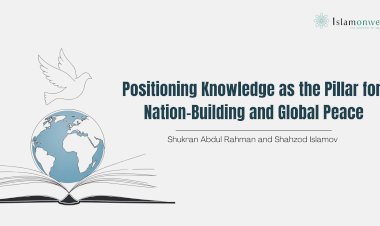Orientalism: The Western Hierarchy Against Islam
Orientalism often surfaces in discussions related to Islamic studies, though its deeper implications might not be widely recognized by the general public. Commonly perceived as Western scholarship on the East, a more thorough investigation reveals Orientalism as an intellectual movement that has significantly influenced the trajectory of human progress by wielding the authority of an academic discipline, rooted in anti-Islamic sentiments.
This discussion is not just an exploration of Orientalism in its broadest sense but an affirmation of the critique posed by the renowned scholar Edward Said. Said contended that Orientalism serves as a vehicle for false propaganda, emerging from a desire to dominate and subjugate those deemed as "others" by the West. It is also an effort to expose the Western tendency to depict the East—particularly the Islamic world, which played a pivotal role in the development of European civilization—as barbaric.
The motivation behind Orientalist studies was not merely academic curiosity or the desire to understand Eastern art, religion, language, and culture. Instead, these studies were often driven by ulterior motives, aiming to establish a Western superiority narrative. While Orientalists have indeed examined various aspects of Eastern cultures, their work frequently intersected with a broader agenda: a subtle yet persistent campaign against Islam.
Islam and Orientalism
Orientalism is an intellectual movement that emerged in Christian Europe with the primary aim of studying the languages, cultures, literatures, histories, and religions of the East. Although it encompasses a broad region east of the Mediterranean Sea, the primary focus of Orientalism has been Islamic studies. This focus is why various African countries, such as Morocco, along with other Islamic nations, fell within the purview of Orientalist research. Interestingly, individuals from outside this geographical range who engage in these studies are referred to as Orientalists. However, figures like Philip K. Hitti, born in Arabia and later settled in America, and Taha Hussein, who adopted an Orientalist approach in his work, are not considered true Orientalists.
The term "Orientalism" itself dates back to the late eighteenth or early nineteenth century. However, the origins of Orientalist studies stretch back several centuries earlier. While pinpointing an exact chronology is challenging, it is generally believed that Orientalism began to take shape in the eleventh or twelfth centuries. The movement's development was significantly influenced by a desire to distort the image of Islam in the European mind, particularly after the realization that Islam could not be subdued through military force alone, as evidenced by the failures of the Crusades.
This realization, coupled with the European arrogance that followed the Crusades and the influence of Muslim Spain, led to a conviction that opposing Islam effectively required a deep understanding of it. Consequently, there were vigorous efforts to translate Islamic knowledge into Latin. This drive also sparked the idea of establishing study centers dedicated to Islamic studies within Europe itself, with an underlying goal of converting Muslims to Christianity. Prominent figures like Roger Bacon were instrumental in popularizing this approach.
The Origin of Religious Orientalism
The roots of religious Orientalism can be traced back to the Treaty of Vienna in 1312, under Christian rule. This treaty marked a significant turning point as Islamic chairs were established in European universities such as Oxford and Paris. Over time, the expansion of bilateral relations between Turkey and Europe, coupled with growing economic ties with countries like Spain, Italy, Egypt, and Syria, further propelled the development of Orientalism.
During this period, Europe was also undergoing an intellectual revolution, which coincided with the Vatican’s decision to intensify its missionary activities with a focus on the East. This convergence led to a dual approach in the study of Islam: on one hand, there were efforts to study Islam objectively, and on the other hand, there were attempts to distort and misrepresent the religion.
Notable works emerged from this period that reflected these conflicting approaches. Simon Oakley’s History of Arabian Muslims and Pierre Bayle’s Historical and Literary Dictionary are examples of literature that sought to distort the image of Muslims. However, Hadrian Reland's De Religione Mohammedica, published around the same time, is regarded as the first book to present Islam in its authentic form. Despite being outlawed by the Catholic Church, the book was translated into several languages, including French, German, Spanish, and English, allowing its more accurate portrayal of Islam to reach a wider audience.
The Development of Orientalism: Five Key Stages
The evolution of Orientalism can be delineated into five stages, each marked by shifts in its methods and objectives in response to changing circumstances.
- The Period of Islamic Spain: With the advent of Islam in Spain, Muslim scholars not only established political dominance but also fostered a vibrant intellectual community. The world marveled at Cordoba and Granada, which became renowned centers of knowledge and cultural legacy. Even the West has acknowledged the intellectual flourishing that occurred during this time. In 1158, when Ibrahim Ibn Adra’, a scholar from Toledo, advocated for the importance of Islamic knowledge in England, it sparked a significant flow of scholars from England to the universities of Spain. This era was characterized by a surge in translation activities. Peter the Venerable assembled a team of translators to convert Arabic texts into Latin, leading to the first Quran translation by Robert of Ketton in 1143. By 1187, Gerard de Cremona had translated around sixty books into Latin, including the works of notable scholars like Ibn Sina and Al-Razi.
- Post-Crusades Period: Following the severe defeats suffered by the Crusaders, Christian leaders began to distort the image of Islam as a strategic response. They realized that the only way to counter and potentially defeat Islam was through misrepresentation. During this period, efforts to discredit Islam were accompanied by the persecution and killing of Islamic scholars.
- The Period of Colonization and the Industrial Revolution: The colonization period, marked by the Industrial Revolution, saw Europe’s aggressive expansionist policies extend into the Muslim world. As European powers sought to subjugate global territories, they also worked to distort Islam, often operating from administrative centers and foreign ministries that infiltrated the colonized East. Arabic texts and other valuable Islamic manuscripts were systematically smuggled into Europe, leading to a significant loss for the Islamic intellectual legacy. Many of these manuscripts, often the only existing handwritten copies, were irretrievably lost to the Islamic world.
When Napoleon conquered Egypt in the early 19th century, it is widely believed that numerous Islamic manuscripts were smuggled to France. Similarly, many precious texts were looted from India and transported to European libraries, which became filled with books stolen from the Orient. During this period, influential figures like Muhammad Abduh, Taha Hussein, and others became prominent in the Orientalist discourse, often under the guise of preserving Islamic thought while aligning with Western ideologies.
Simultaneously, European interest in Islamic history and literature grew, leading to the publication of approximately 60,000 books about Arabia between 1811 and 1950. This era marked a significant expansion in the study of Islam in the West, though often through a lens distorted by colonial ambitions.
- The Anti-Colonial Period and the Rise of Independence Movements: As anti-colonial movements gained momentum, leading to widespread demands for independence, the West adopted a policy of appeasement. This period saw the Muslim world increasingly drawn toward Western culture and ways of life. The West, seizing this opportunity, established numerous educational institutions in Muslim-majority countries. During this time, many Western university professors, often disguised as military officers or other officials, infiltrated the Muslim world, carrying out covert operations aimed at furthering Western interests.
The Scarborough Report, presented by Britain after World War I, can be seen as a blueprint for modern Orientalism. The strategies and recommendations outlined in this report have been implemented by Orientalists for over a century, shaping the ongoing relationship between the West and the Muslim world.
- The Era of Financial Security: In this stage, Orientalist studies and activities shifted from being driven by religious hate propaganda to being influenced by socio-economic factors, particularly after the discovery of oil, which brought unprecedented prosperity to the Muslim world. This newfound wealth, however, also exacerbated divisions within the Muslim community, deepening the rifts between Sunni, Shia, and Kurdish factions. These divisions were often subtly manipulated by external forces, and many within the Muslim community fell into these traps without realizing it.
In conclusion, it is evident that the lack of unity within the Muslim community played a significant role in leading to the current predicament. While it is easy to attribute these challenges solely to Orientalist thinking, it is crucial to recognize the influence of other ideologies such as Zionism, Communism, and Masonism. Although these ideologies may compete with each other in other arenas, when it comes to Islam, they often act in unison, like different oars rowing the same boat.
Reference
Edward.W. said: Orientalism
Orientalism; intellectual crusade on Islam: E.M Suhail hudawi chembulangad
About the author
Adil kadavath, is a degree scholar at Darul Huda Islamic University. He is studying in the Department of Aqeeda and Philosophy.
Disclaimer
The views expressed in this article are the author’s own and do not necessarily mirror Islamonweb’s editorial stance.
























Leave A Comment